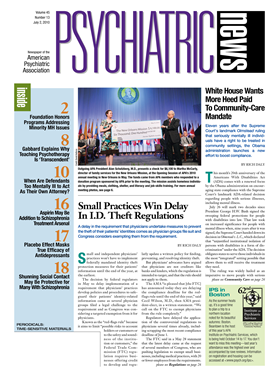California is moving toward broadening the state's mental health insurance parity requirements. Such an expansion in protection for people with mental illness would buck a more prevalent trend in which states are cutting mental health care spending as a way to help offset growing recession-driven budget woes.
The California Assembly passed an expansion of the state's mental health parity law (AB 1600) on June 1 requiring most health insurance plans to provide coverage for all DSM mental illness diagnoses (including substance abuse) and “medically necessary” treatment for those illnesses. The bill would expand the current coverage requirement from undefined “severe mental illnesses” to any diagnosis in DSM-IV and subsequent editions of the diagnostic manual.
The state Senate has not yet taken up the measure.
The measure goes beyond the federal health care overhaul law, which requires parity insurance coverage only in plans that already offer coverage for psychiatric conditions.
The bill, sponsored by State Assembly Member Jim Beall Jr. (D)—the 2009 recipient of APA's Jacob K. Javits Public Service Award—would apply to insurance policies issued after January 1, 2011, and includes some exceptions for public-employee plans.
The full chamber is not expected to pass the bill this year due to its ongoing scramble to address the state's looming $19 billion budget deficit, according to Marc Graff, M.D., president of the California Psychiatric Association.
Wisconsin Improves MH Coverage
Another state that recently moved to expand coverage for people with mental illness was Wisconsin, where state officials eliminated all dollar-amount and service limitations for mental health and substance abuse treatment in the Medicaid program's BadgerCare Plus Benchmark Plan. The move was designed to mandate equality in coverage for mental illness treatment and other types of medical care.
The change—retroactive to January 1—is expected to benefit the 14,496 children and pregnant or postpartum women enrolled in Wisconsin's Medicaid program. It also brings the state into compliance with the 2008 federal parity law, which requires Medicaid managed care organizations that offer mental health coverage to do so at parity with other types of medical care.
Minnesota Creates Task Force
In another Midwestern state, however, mental health care services could expand. The Minnesota legislature created the Chemical and Mental Health Services Transformation Task Force, which will suggest ways in which lawmakers can act to improve the continuum of services needed for people with mental illnesses, including substance abuse and traumatic brain injury.
The task force, which will be composed of legislators, state mental health officials, and mental health advocates, is to recommend changes in service-delivery models, ways to eliminate gaps in and barriers to accessing quality care, and plans to ensure that individuals with complex mental health needs receive the appropriate level of care. The task force's recommendations are due to the legislature by December 15.
The task force was one of several created by the Minnesota legislature in the recent session as election year pressures led members to defer funding expansions for care sought by mental health and other patient-care advocates.
Care Reductions Coming in Missouri
Among the states cutting mental health spending due to budget constraints is Missouri. The state's $23.3 billion Fiscal 2011 budget reduced spending by $500 million overall, including $1.4 million in cuts to federally qualified community mental health centers and elimination of state funding for rural health clinics.
Missouri mental health care advocates said the cuts for the fiscal year beginning July 1 eliminate publicly funded care for about 2,200 Missourians with severe mental illness.
